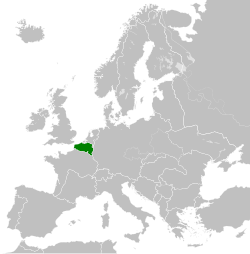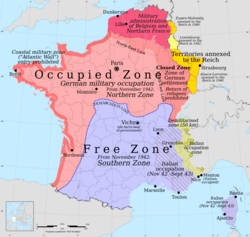Military Administration in Belgium and Northern France
This article needs additional citations for verification. (August 2009) |
The Military Administration in Belgium and Northern France (German: Militärverwaltung in Belgien und Nordfrankreich) was an interim occupation authority established during the Second World War by Nazi Germany that included present-day Belgium and the French departments of Nord and Pas-de-Calais.[1] The administration was also responsible for governing the zone interdite, a narrow strip of territory running along the French northern and eastern borders.[2] It remained in existence until July 1944. Plans to transfer Belgium from the military administration to a civilian administration were promoted by the SS, and Hitler had been ready to do so until Autumn 1942, when he put off the plans for what was intended to be temporary but ended up being permanent until the end of German occupation.[3] The SS had suggested either Josef Terboven or Ernst Kaltenbrunner as the Reich Commissioner of the civilian administration.[4]
Military Administration in Belgium and Northern France | |||||||||||
|---|---|---|---|---|---|---|---|---|---|---|---|
| 1940–1944 | |||||||||||
 | |||||||||||
 German and Italian occupation zones: the zone occupée, the zone libre, the zone interdites, annexed Alsace-Lorraine, Luxembourg and Eupen-Malmédy, and the Military Administration in Belgium and Northern France | |||||||||||
| Status | Territory under German military administration | ||||||||||
| Capital | Brussels | ||||||||||
| Common languages | German Dutch French | ||||||||||
| Military Commander | |||||||||||
• 1940 | Gerd von Rundstedt | ||||||||||
• 1940–1944 | Alexander von Falkenhausen | ||||||||||
| Administrator | |||||||||||
• 1940–1944 | Eggert Reeder | ||||||||||
| Historical era | World War II | ||||||||||
• Established | 1940 | ||||||||||
• Disestablished | 1944 | ||||||||||
| Currency | Belgian franc | ||||||||||
| |||||||||||
| Today part of | Belgium France | ||||||||||
Reichskommissariat
editOn 18 July 1944, the Military Administration was replaced by a civil one, led by the Gauleiter, Josef Grohé, who was named the Reichskommissar of the Reichskommissariat of Belgium and Northern France (Reichskommissariat Belgien und Nordfrankreich).[1][5]
Role of collaborationist groups
editThe Nazi administration was assisted by fascist Flemish, Walloon, and French collaborationists. In binational Belgian territory, the predominantly French region of Wallonia, the collaborationist Rexists provided aid to the Nazis while in Flemish-populated Flanders, the Flemish National Union supported the Nazis. In Northern France, Flemish separatist tendencies were stirred by the pro-Nazi Vlaamsch Verbond van Frankrijk led by priest Jean-Marie Gantois.[6]
The attachment of the departments Nord and Pas-de-Calais to the military administration in Brussels was initially made on military considerations, and was supposedly done in preparation for the planned invasion of Britain.[7] Ultimately, the attachment was based on Hitler's intention to move the Reich's border westward, and was also used to maintain pressure on the Vichy regime – which protested the curtailment of its authority in what was still de jure national French territory – to ensure its good behavior.[8]
Command structure
editThe Military Administration formed the core of a wider command structure which allowed the governance of occupied Belgium. It could rely on both military and civilian components:
| Military Administration in Belgium and Northern France Militärverwaltung in Belgien und Nordfrankreich Part of the Wehrmacht Militärbefehlshaber: Alexander von Falkenhausen | Sipo-SD Part of the Sicherheitspolizei-Sicherheitsdienst Independent of the Military Administration and directed from Berlin. | ||||||||||||||||||||||||||||||||||||
| Military Administrative Staff Militärverwaltungsstab Militärverwaltungschef: Eggert Reeder | Command Staff Kommandostab Chef des Kommandostabs: Bodo von Harbou | ||||||||||||||||||||||||||||||||||||
| Committee of Secretaries-General Representatives of the Belgian civil administration | Economic Department Wirtschaftsabteilung | Feldgendarmerie and Geheime Feldpolizei | Geheime Staatspolizei (Gestapo) Part of the SS | ||||||||||||||||||||||||||||||||||
| Belgian civil service: Burgomasters and local government; Belgian police and state security | Regional and district headquarters: Oberfeld-, Feld- or Kreiskommandanten | Belgian collaborationist groups Principally the Vlaams Nationaal Verbond (VNV) or Rex; Each with internal command structure. | |||||||||||||||||||||||||||||||||||
Based on description in Van den Wijngaert, Mark; Dujardin, Vincent (2006). "La Belgique sans Roi, 1940-1950". Nouvelle Historie de Belgique. Vol. 2: 1905-1950. Brussels: Éd. Complexe. pp. 19–20. ISBN 2-8048-0078-4.
See also
editReferences
edit- ^ a b "Reichskommissariat Belgien und Nordfrankreich".
- ^ Vinen, Richard (2006). The Unfree French: Life under the Occupation (1st ed.). London: Allen Lane. pp. 105–6. ISBN 0-713-99496-7.
- ^ Kroener, Müller & Umbreit (2003) Germany and the Second World War V/II, p. 26
- ^ Kroener, Müller & Umbreit (2003) Germany and the Second World War V/II, p. 27
- ^ Kroener, Müller & Umbreit (2003) Germany and the Second World War V/II, p. 29
- ^ Kroener, Bernhard R.; Müller, Rolf-Dieter; Umbreit, Hans (2000). Germany and the Second World War:Organization and mobilization of the German sphere of power. Wartime administration, economy, and manpower resources 1939-1941. Oxford University Press. p. 84. ISBN 0198228872.
- ^ Jackson, Julian (2003). France: the dark years, 1940-1944. Oxford University Press. pp. 169. ISBN 0199254575.
- ^ Kroener et al. (2000), p. 84
Further reading
edit- Dejonghe, Etienne (January–March 1970). "Un mouvement séparatiste dans le Nord et le Pas-de-Calais sous l'occupation (1940-1944): le "Vlaamsch Verbond van Frankrijk"". Revue d'histoire moderne et contemporaine. 17 (1): 50–77. doi:10.3406/rhmc.1970.2058. JSTOR 20527887.
- Geller, Jay Howard (January 1999). "The Role of Military Administration in German-Occupied Belgium, 1940-1944". The Journal of Military History. 63 (1): 99–125. doi:10.2307/120335. JSTOR 120335.
- Wouters, Nico (2006). "Localisation in the Age of Centralisation: Local Government in Belgium and Nord-Pas-de-Calais (1940-1945)". In De Wever, Bruno; Van Goethem, Herman; Wouters, Nico (eds.). Local Government in Occupied Europe (1939-1945). Ghent: Academia Press. pp. 83–108. ISBN 9789038208923.
- Sueur, Marc (1984). "La Collaboration Politique dans le Département du Nord (1940-1944)". Revue d'histoire de la Deuxième Guerre mondiale et des conflits contemporains. 34 (135): 3–45. JSTOR 25729197.
- De Jonghe, Albert (1972). Hitler en het politieke lot van België, 1940-1944. De vestiging van een Zivilverwaltung in België en Noord-Frankrijk. Antwerp: Uitgeverij De Nederlandssche Boekhandel.
- Verhoeyen, Etienne (26 January 2011). "Een Duits netwerk bij de voorbereiding van de Militärverwaltung in België (1939-1940)". WT. Tijdschrift over de Geschiedenis van de Vlaamse Beweging. 69 (4): 289–305. doi:10.21825/wt.v69i4.12342.
- Dejonghe, Étienne (1971). "Aspects du régime d'occupation dans le Nord et le Pas-de-Calais durant la seconde guerre mondiale". Revue du Nord. 53 (209): 253–268. doi:10.3406/rnord.1971.3113.
External links
edit- (in German) Militärbefehlshaber Belgien/Nordfrankreich: Gliederung (administrative structure) at Lexikon der Wehrmacht.

